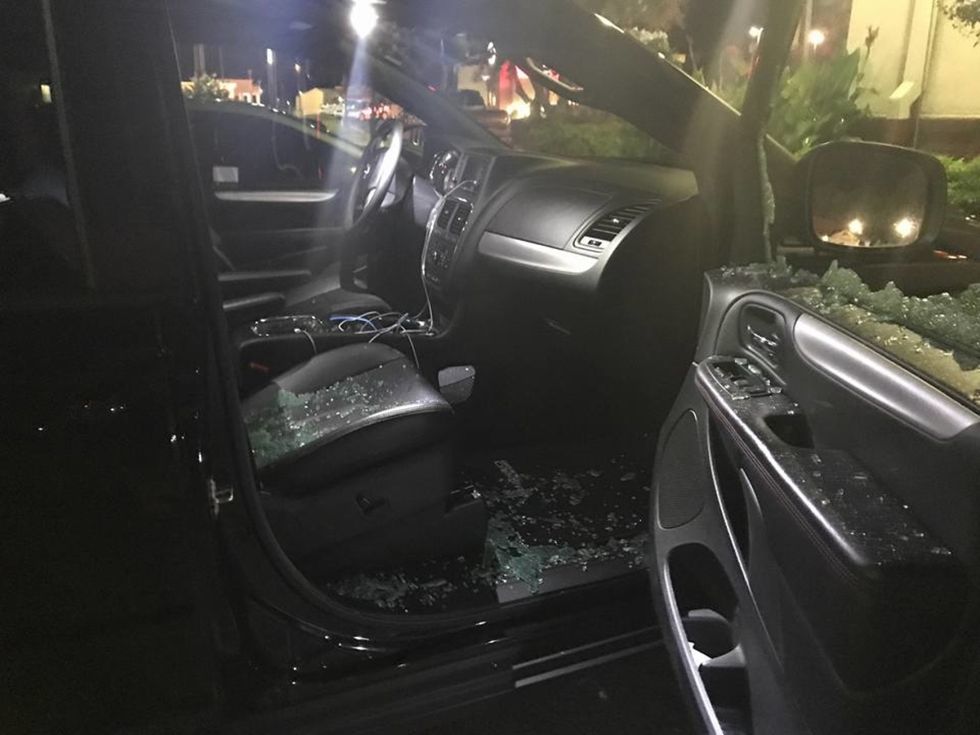Wednesday afternoon, I started the long trek up to New York from Tallahassee, Florida. We planned to make the drive in two days: the first day we would stop in Knoxville, and then we’d drive the next day all the way to Buffalo. As often is the case, things did not go as planned: after enjoying a nice sit-down dinner in a small town in Georgia, we walked into the parking lot and realized our rental car had been broken into.
The passenger door window was smashed; there was glass all over the carseat, the middle console, and the pavement. We immediately called the police and got the attention of the manager of the restaurant. I barely noticed all of this, though, because I was so astonished that it had actually happened to me. I’ve been privileged to live my whole life so far without a single significant breach in my safety. I’d never felt so suddenly vulnerable to all sorts of dangers like I did in the half hour following the incident.
In the end, we found out that the only things missing from the car was a Michael Kors bag and my boyfriend’s mema’s work laptop. Of course it was horrible that these things were taken, but we realized we were also quite fortunate: our Dodge Grand Caravan was chock-full of not only monetary valuables, like my guitar, our game systems, and other laptops, but also emotional valuables that could’ve been damaged or lost.
For the rest of the night, I was driven wild by what-ifs: what if more had been taken? What if Mema had gone to get her drink from the car like she said she wanted to? Would she have walked right in on the robbery? What if we had parked somewhere else? What if we had kept driving through and not stopped in that town? Was there a way this could have been prevented? What if it happened again?
I had a dream that night in the hotel that the rest of our luggage sunk through the floorboards of the rental car like sinking sand. I woke up feeling similar: like I was slowly drowning in my thoughts of other scenarios, other what-ifs.
When we parked the car to get lunch the next day, we made jokes about how we’d park it right in front where we could see it from the restaurant windows. Even though we were being light-hearted, there was certainly a semblance of truth behind our joking. We were all still shaken up about it.
It wasn’t until we stopped again for dinner that it hit me: I had to stop worrying about the what-ifs. I had to stop worrying about what we could have done differently, because it didn’t matter: it had happened. And I also had to stop worrying about whether it would happen again, because I had no control over that. When it comes down to it, we really don’t have any control over a lot of things.
With this new mantra in mind, I was able to shake off most of my fear and keep moving forward. I brought this attitude with me to my first days on campus. It came in handy yesterday at my oboe placement audition, where, instead of worrying about how everyone was going to be way better than me, I focused on what I could control: my own performance.
I used to think that dwelling on what-ifs helped me to process the things that happened in my life, but what the break-in taught me was that it really just keeps you from moving forward. Obviously this will be an ongoing process — if it were easy to stop, no one would have a problem worrying about what-ifs — but until the fear is totally gone, I’m focusing on what I can control: locking my car, hiding my valuables, and parking in a well-lit area. Because when it comes down to it, focusing on what we can control is the only thing, and the best thing, that we can do.
















